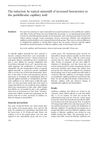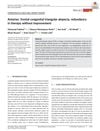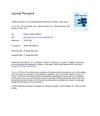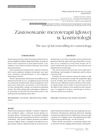 15 citations,
July 2017 in “PubMed”
15 citations,
July 2017 in “PubMed” Injecting a mix of human skin and hair cells into mice can grow new hair.
 14 citations,
May 2013 in “American Journal of Physiology-endocrinology and Metabolism”
14 citations,
May 2013 in “American Journal of Physiology-endocrinology and Metabolism” Removing myelin protein zero-like 3 in mice leads to better metabolism and resistance to obesity.
 13 citations,
January 2022 in “Stem cell reviews and reports”
13 citations,
January 2022 in “Stem cell reviews and reports” Mouse stem cells from hair follicles can improve wound healing and reduce scarring.
 12 citations,
February 1999 in “British Journal of Dermatology”
12 citations,
February 1999 in “British Journal of Dermatology” Minoxidil increased small openings in blood vessel walls near growing hair in rats.
 10 citations,
May 2018 in “Forensic Science International”
10 citations,
May 2018 in “Forensic Science International” Shrunken heads retain some facial features and hair characteristics, allowing for limited individual identification.
 9 citations,
July 2020 in “Experimental Dermatology”
9 citations,
July 2020 in “Experimental Dermatology” Topical L-thyroxine may help with wound healing and hair growth but should be used short-term due to potential risks.
 9 citations,
October 2018 in “Elsevier eBooks”
9 citations,
October 2018 in “Elsevier eBooks” Nanotechnology is improving drug delivery and targeting, with promising applications in cancer treatment, gene therapy, and cosmetics, but challenges remain in ensuring precise delivery and safety.
 8 citations,
August 2019 in “Dermatologic surgery”
8 citations,
August 2019 in “Dermatologic surgery” Nonsteroid treatments for alopecia areata show promise but need more high-quality research.
 8 citations,
January 2017 in “Stem Cells International”
8 citations,
January 2017 in “Stem Cells International” A protein called sFRP4 from skin cells stops the development of pigment-producing cells in hair.
 8 citations,
October 1989 in “International Journal of Dermatology”
8 citations,
October 1989 in “International Journal of Dermatology” Cytochrome P-450 enzymes in the skin help break down various substances and could be targeted to treat skin conditions.
 7 citations,
December 2021 in “Curēus”
7 citations,
December 2021 in “Curēus” Breast cancer skin metastases are rare, look different, and can be confused with other skin issues, so a biopsy is needed for accurate diagnosis.
 7 citations,
July 2018 in “Journal of Functional Biomaterials”
7 citations,
July 2018 in “Journal of Functional Biomaterials” A new anti-baldness patch effectively treats hair loss by blocking enzymes linked to the condition.
 7 citations,
March 2007 in “International Journal of Dermatology”
7 citations,
March 2007 in “International Journal of Dermatology” Targeting FGFR-1 with antisense oligonucleotides may help treat baldness by increasing hair follicle activity.
 5 citations,
November 2020 in “Cells”
5 citations,
November 2020 in “Cells” Placental mesenchymal stem cells and their conditioned medium significantly improve healing in local radiation injuries.
 5 citations,
October 2018 in “Dermatologic therapy”
5 citations,
October 2018 in “Dermatologic therapy” Recognizing congenital triangular alopecia is crucial to avoid unnecessary treatments.
 5 citations,
January 2013 in “Otorhinolaryngology clinics : an international journal”
5 citations,
January 2013 in “Otorhinolaryngology clinics : an international journal” Platelet-rich plasma may improve healing and hair growth in cosmetic surgery but results vary.
 5 citations,
November 2006 in “Dermatologic Surgery”
5 citations,
November 2006 in “Dermatologic Surgery” Hair transplant surgery is a good cosmetic solution for people with little or no pubic hair, especially to boost their self-esteem.
 4 citations,
April 2021 in “Journal of Cosmetic Dermatology”
4 citations,
April 2021 in “Journal of Cosmetic Dermatology” Botulinum toxin may help hair loss by increasing blood flow and reducing harmful factors.
 4 citations,
October 2020 in “JAAD Case Reports”
4 citations,
October 2020 in “JAAD Case Reports” Platelet-rich plasma may improve vitiligo treatment when used with phototherapy.
 4 citations,
September 2020 in “Journal of Cosmetic Dermatology”
4 citations,
September 2020 in “Journal of Cosmetic Dermatology” PRP treatment significantly increased hair density and thickness in male hair loss.
 4 citations,
August 2018 in “Facial Plastic Surgery Clinics of North America”
4 citations,
August 2018 in “Facial Plastic Surgery Clinics of North America” Platelet-Rich Plasma (PRP), a protein-rich extract from a patient's blood, shows promise in improving hair density, thickness, and quality, but the best method of use and number of treatments needed for noticeable results are still unclear.
 4 citations,
January 2015 in “Journal of clinical & experimental dermatology research”
4 citations,
January 2015 in “Journal of clinical & experimental dermatology research” PRP injections may slightly improve hair density and count for male hair loss, but more research is needed.
 3 citations,
December 2019 in “Journal of Cosmetic and Laser Therapy”
3 citations,
December 2019 in “Journal of Cosmetic and Laser Therapy” PRGF treatments increased hair number and thickness in people with hair loss, with more injections leading to better results.
 3 citations,
September 2018 in “Dermatologic Surgery”
3 citations,
September 2018 in “Dermatologic Surgery” Platelet-Rich Plasma (PRP) can improve hair loss in cicatricial alopecia cases, but treatment must be ongoing and results vary among patients.
 2 citations,
January 2022 in “Skin appendage disorders”
2 citations,
January 2022 in “Skin appendage disorders” A combination of methotrexate injections and CO2 laser treatment led to complete hair regrowth in two patients with hard-to-treat alopecia.
 2 citations,
January 2018 in “Journal of clinical & experimental dermatology research”
2 citations,
January 2018 in “Journal of clinical & experimental dermatology research” Both fat-derived stem cells and platelet-rich plasma are effective and safe for hair loss, but stem cells give better results with more side effects.
 1 citations,
September 2023 in “Dermatology and therapy”
1 citations,
September 2023 in “Dermatology and therapy” More research is needed to find the best treatment for dissecting cellulitis of the scalp.
 1 citations,
June 2021 in “Curēus”
1 citations,
June 2021 in “Curēus” A woman with hair loss had a benign sweat duct tumor found during a scalp biopsy.
 1 citations,
April 2021 in “Aesthetic Cosmetology and Medicine”
1 citations,
April 2021 in “Aesthetic Cosmetology and Medicine” Microneedling improves skin conditions and self-esteem when tailored to individual needs and combined with other treatments.
 1 citations,
January 2021 in “Dermatological reviews”
1 citations,
January 2021 in “Dermatological reviews” Hair transplantation improves androgenetic alopecia with high patient satisfaction.






























